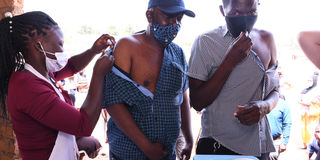Why children cannot be vaccinated against Covid

A health worker administers an AstraZeneca vaccine to a resident of Makindye Division, Kampala City, on June 22. PHOTO/RACHEL MABALA
What you need to know:
The WHO states that Covid-19 vaccines are safe for people above 18 years.
Whereas much of the focus now is on vaccination to get out of the Covid-19 pandemic, those aged below 18 years have not had the chance to get vaccinated.
Unlike other vaccines such as measles and polio that are usually given at younger age, parents have questioned why their children are not being allowed to get the Covid jabs.
Dr Misaki Wayengera, the head of the Ministerial Scientific Advisery Committee on Covid-19, said as per the World Health Organisation (WHO) guidelines, the studies on vaccines have been done for those above 18 years.
“Remember Covid-19 was shown to cause severe illness and deaths among people who are older rather the young people. As a result of that, the clinical trials of Covid-19 vaccine started among the adult consenting population,” Dr Wayengera said.
“We have seen countries beginning to vaccinate those under 18 starting from 12 years upwards. Children get Covid much as its not severe. Some children get what we call multi system inflammatory syndrome, which is a kind of auto immune reaction. To avoid this certainly, we need to think of bringing down the vaccination age. The problem though has been logistics,” he added.
Dr Richard Idro, the president of Uganda Medical Association, said Covid-19 vaccines should be given to those who are 18 years and older.
He, however, said research is being conducted for children between 12 and 18 years. However, some of the countries have started using Pfizer vaccine for emergency use in children aged between 12 and 15.
According to Lancet Infectious Disease Website, Canada is one of the countries that has approved Covid-19 vaccine for emergency use in children aged 12 and 15.
US Food and Drug Administration and European Medicines Agency also gave the green light to the Pfizer-BioNTech Covid-19 vaccine for adolescents.
WHO states that Covid-19 vaccines are safe for people above 18 years, including those with auto-immune disorders, hypertension, diabetes, asthma, pulmonary, liver, and kidney diseases.
“Children and adolescents tend to have milder disease compared to adults, so unless they are part of a group at higher risk of severe Covid-19, it is less urgent to vaccinate them,” reads information on the WHO website in part.
WHO further states that, WHO’s Strategic Advisery Group of Experts (SAGE), concluded that the Pfizer vaccine is suitable for use by people aged 12 and above.
Children aged between 12 and 15, who are at high risk may be offered this type of vaccine alongside other priority groups for vaccination.
Vaccine trials for children are ongoing and WHO will update its recommendations when the evidence or epidemiological situation warrants a change in policy.
Prof David Sserwadda, the head of Covid-19 vaccine advisery committee, said there is shortage of vaccines and children do not have serious morbidity and mortality in regards to Covid-19.
However, according to scientists, more evidence is needed on the use of the different Covid vaccines in children to be able to make general recommendations on vaccination.
In the second wave, more young people have been affected by Covid-19 unlike the first wave. For example, in Kampala, according to data from March 21 last year to July 3, the number of confirmed cases in the city, standing at 44,774, had most incidence among the youthful population, with the most affected age group being 30 to 39 with 12,871 cases (28.7 per cent), followed by those aged 20 to 29 with 10,310 cases (23 per cent).
The age groups with the least cases are those above 90 with 167 cases (0.4 per cent), and those aged 80 to 89 with 314 (0.7 per cent).
Uganda has administered at least 1 million doses of Covid-19. It plans to vaccinate 21.9 million people.





